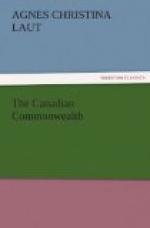Nightfall found us back in the channel again scudding before thunder and a hurricane wind looking for a camping place. It had been a back-breaking pace all day. We had tried to find relief by the Indian’s choppy strokes changing every third dip from side to side; we had tried the white man’s deep long pulling strokes; and by seven in the evening with the thunder rolling behind and not a spot of dry land visible the size of one’s foot, backs began to feel as if they might break in the middle. Our canoe and dunnage weighed close on seven hundred pounds. Suddenly we shot out of the amber channel into a shallow lagoon lined on each side by the high tufted reeds, but the reeds were so thin we could see through them to lakes on each side. A whirr above our heads and a flock of teal almost touched us with their wings. Simultaneously all three dropped paddles—all three were speechless. The air was full of voices. You could not hear yourself think. We lapped the canoe close in hiding to the thin lining of reeds. I asked, “Have those little sticks drifted down fifteen hundred miles to this lagoon of dead water?”
“Sticks,” my guide repeated, “it isn’t sticks—it isn’t drift—it’s birds—it’s duck and geese—I have never seen anything like it—I have lived west more than twenty years and I never heard tell of anything—of anything like it.”
Anything like it? I had lived all my life in the West and I had never heard or dreamed any oldest timer tell anything like it! For seven miles, you could not have laid your paddle on the water without disturbing coveys of geese and duck, geese and duck of such variety as I have never seen classified or named in any book on birds. We sat very still behind the hiding of reed and watched and watched. We couldn’t talk. We had lost ourselves in one of the secluded breeding places of wild fowl in the North. I counted dozens and dozens of moult nests where the duck had congregated before their long flight south. That was the night we could find camping ground only by building a foundation of reeds and willows, then spreading oilcloth on top; and all night our big tent rocked to the wind; for we had roped it to the thwarts of the canoe. Next day when we reached the fur post, the chief trader told us any good hunter could fill his canoe—the big, white banded, gray canoe of the company, not the little, seven banded, birch craft—with birds to the gun’l in two hours’ shooting on that lake.
That muskeg is only one of thousands, when you go seventy miles north of the Saskatchewan, sixty miles east of Athabasca Lake. That muskeg and its like, covering an area two-thirds of all Europe, is the home of all the little furs, mink and muskrat and fisher and otter and rabbit and ermine, the furs that clothe—not princes and millionaire, who buy silver fox and sea otter—but you and me and the rest of us whose object is to keep warm, not to show how much we can spend. Out of that one muskeg hundreds of thousands of little pelts have been taken since 1754 when Anthony Hendry, the smuggler, came the first of the fur-traders inland from the Bay. And the game—save in the year of the unexplained rabbit pest—shows no sign of diminishing.




